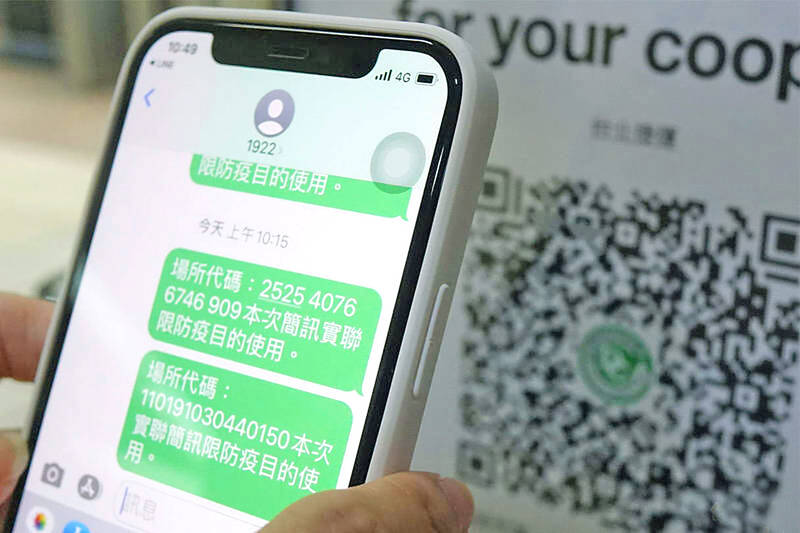About 4.78 billion text messages that people had sent to the Central Epidemic Command Center (CECC) as part of the nation’s COVID-19 prevention efforts have been deleted, the National Audit Office said on Friday.
The center had asked people to send it a message with location data when entering stores and other widely frequented places from 2021 to last year, as it sought to trace the contacts of all confirmed COVID-19 cases.
People were asked to scan a QR code at location entrances, prompting an automatically generated message containing the number that the CECC had assigned to the venue to pop up on their smartphone.

Photo: Chien Li-chung, Taipei Times
Sending the messages to the center’s 1922 hotline was free of charge.
The office said in a statementthat the National Communications Commission (NCC) and telecoms had helped set up databases of the hotline’s location data.
The data helped local health departments trace the movements of people infected with COVID-19 and notify those who had been near them, it said.
About 4.78 billion automatically generated messages had been sent to the hotline from May 2021 to May last year, the office said.
However, the office said that oversight over the database had at times been insufficient.
“In May last year, we found that the National Communications Commission did not check all data storage locations to see whether the text messages were completely deleted, including their main and backup servers,” the office said.
“Some disease prevention agencies accessed text messages in databases using private computers and mobile devices. The messages on the non-governmental devices could still be downloaded even after the government had stopped requiring people to access the 1922 text messages,” it said.
The Executive Yuan’s Cybersecurity Department, which in August last year became the Administration of Cybersecurity under the Ministry of Digital Affairs, at the time failed to conduct an external audit to ensure that messages were completely deleted or destroyed, exposing the data to the risk of being leaked to a third party through improper use, the office said.
After finding the oversight lapses, the office continued to track the progress that agencies made in erasing the text messages, it said.
As of the end of last year, the NCC had terminated its contracts with telecoms, and ensured that databases were closed and no messages were in them, it said.
The CECC also ensured text messages downloaded by local government officials had all been destroyed, the office said.
“The Administration of Cybersecurity has listed management systems for electronic disease prevention data as an item for cybersecurity evaluation,” the office said, adding that the evaluation would “lower the risk of personal data being leaked to third parties.”

The High Prosecutors’ Office yesterday withdrew an appeal against the acquittal of a former bank manager 22 years after his death, marking Taiwan’s first instance of prosecutors rendering posthumous justice to a wrongfully convicted defendant. Chu Ching-en (諸慶恩) — formerly a manager at the Taipei branch of BNP Paribas — was in 1999 accused by Weng Mao-chung (翁茂鍾), then-president of Chia Her Industrial Co, of forging a request for a fixed deposit of US$10 million by I-Hwa Industrial Co, a subsidiary of Chia Her, which was used as collateral. Chu was ruled not guilty in the first trial, but was found guilty

DEADLOCK: As the commission is unable to forum a quorum to review license renewal applications, the channel operators are not at fault and can air past their license date The National Communications Commission (NCC) yesterday said that the Public Television Service (PTS) and 36 other television and radio broadcasters could continue airing, despite the commission’s inability to meet a quorum to review their license renewal applications. The licenses of PTS and the other channels are set to expire between this month and June. The National Communications Commission Organization Act (國家通訊傳播委員會組織法) stipulates that the commission must meet the mandated quorum of four to hold a valid meeting. The seven-member commission currently has only three commissioners. “We have informed the channel operators of the progress we have made in reviewing their license renewal applications, and

Taiwan People’s Party (TPP) Chairman Huang Kuo-chang (黃國昌) yesterday appealed to the authorities to release former Taipei mayor Ko Wen-je (柯文哲) from pretrial detention amid conflicting reports about his health. The TPP at a news conference on Thursday said that Ko should be released to a hospital for treatment, adding that he has blood in his urine and had spells of pain and nausea followed by vomiting over the past three months. Hsieh Yen-yau (謝炎堯), a retired professor of internal medicine and Ko’s former teacher, said that Ko’s symptoms aligned with gallstones, kidney inflammation and potentially dangerous heart conditions. Ko, charged with

Taiwan-based publisher Li Yanhe (李延賀) has been sentenced to three years in prison, fined 50,000 yuan (US$6,890) in personal assets and deprived political rights for one year for “inciting secession” in China, China's Taiwan Affairs Office spokesman Chen Binhua (陳斌華) said today. The Shanghai First Intermediate People’s Court announced the verdict on Feb. 17, Chen said. The trial was conducted lawfully, and in an open and fair manner, he said, adding that the verdict has since come into legal effect. The defendant reportedly admitted guilt and would appeal within the statutory appeal period, he said, adding that the defendant and his family have